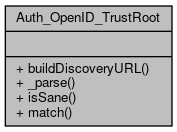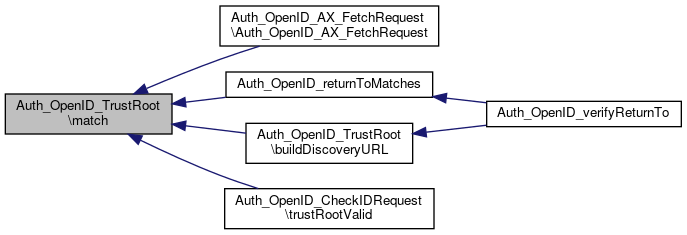A wrapper for trust-root related functions. More...
 Collaboration diagram for Auth_OpenID_TrustRoot:
Collaboration diagram for Auth_OpenID_TrustRoot:Static Public Member Functions | |
| static | buildDiscoveryURL ($realm) |
| static | _parse ($trust_root) |
| Parse a URL into its trust_root parts. More... | |
| static | isSane ($trust_root) |
| Is this trust root sane? More... | |
| static | match ($trust_root, $url) |
| Does this URL match the given trust root? More... | |
Detailed Description
A wrapper for trust-root related functions.
Definition at line 47 of file TrustRoot.php.
Member Function Documentation
◆ _parse()
|
static |
Parse a URL into its trust_root parts.
private
- Parameters
-
string $trust_root The url to parse
- Returns
- mixed $parsed Either an associative array of trust root parts or false if parsing failed.
Definition at line 94 of file TrustRoot.php.
Referenced by Auth_OpenID_returnToMatches(), buildDiscoveryURL(), Auth_OpenID_CheckIDRequest\make(), and Auth_OpenID_CheckIDRequest\trustRootValid().
 Here is the caller graph for this function:
Here is the caller graph for this function:◆ buildDiscoveryURL()
|
static |
Definition at line 59 of file TrustRoot.php.
References $path, $query, _parse(), Auth_OpenID___HostSegmentRe, Auth_OpenID___TLDs, Auth_OpenID_urinorm(), isSane(), and match().
Referenced by Auth_OpenID_verifyReturnTo().
 Here is the call graph for this function:
Here is the call graph for this function: Here is the caller graph for this function:
Here is the caller graph for this function:◆ isSane()
|
static |
Is this trust root sane?
A trust root is sane if it is syntactically valid and it has a reasonable domain name. Specifically, the domain name must be more than one level below a standard TLD or more than two levels below a two-letter tld.
For example, '*.com' is not a sane trust root, but '*.foo.com' is. '*.co.uk' is not sane, but '*.bbc.co.uk' is.
This check is not always correct, but it attempts to err on the side of marking sane trust roots insane instead of marking insane trust roots sane. For example, 'kink.fm' is marked as insane even though it "should" (for some meaning of should) be marked sane.
This function should be used when creating OpenID servers to alert the users of the server when a consumer attempts to get the user to accept a suspicious trust root.
- Parameters
-
string $trust_root The trust root to check
- Returns
- bool $sanity Whether the trust root looks OK
Definition at line 200 of file TrustRoot.php.
Referenced by buildDiscoveryURL().
 Here is the caller graph for this function:
Here is the caller graph for this function:◆ match()
|
static |
Does this URL match the given trust root?
Return whether the URL falls under the given trust root. This does not check whether the trust root is sane. If the URL or trust root do not parse, this function will return false.
- Parameters
-
string $trust_root The trust root to match against string $url The URL to check
- Returns
- bool $matches Whether the URL matches against the trust root
Definition at line 270 of file TrustRoot.php.
Referenced by Auth_OpenID_AX_FetchRequest\Auth_OpenID_AX_FetchRequest(), Auth_OpenID_returnToMatches(), buildDiscoveryURL(), and Auth_OpenID_CheckIDRequest\trustRootValid().
 Here is the caller graph for this function:
Here is the caller graph for this function:The documentation for this class was generated from the following file:
- Services/OpenId/lib/Auth/OpenID/TrustRoot.php






